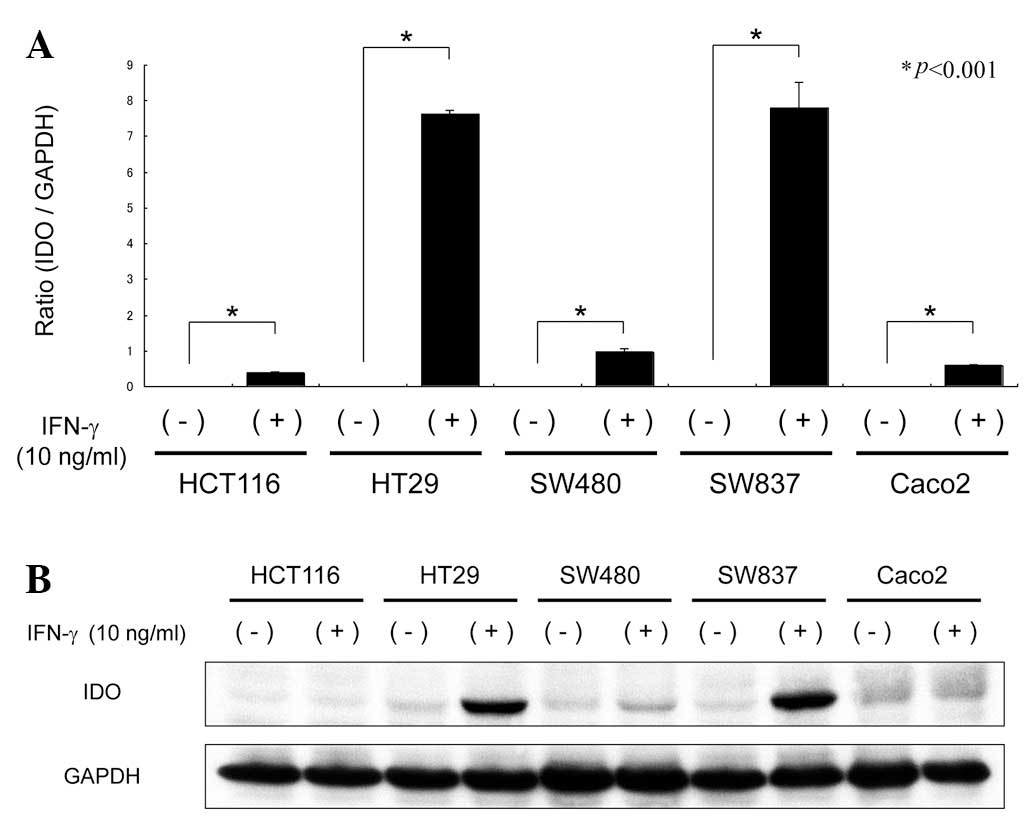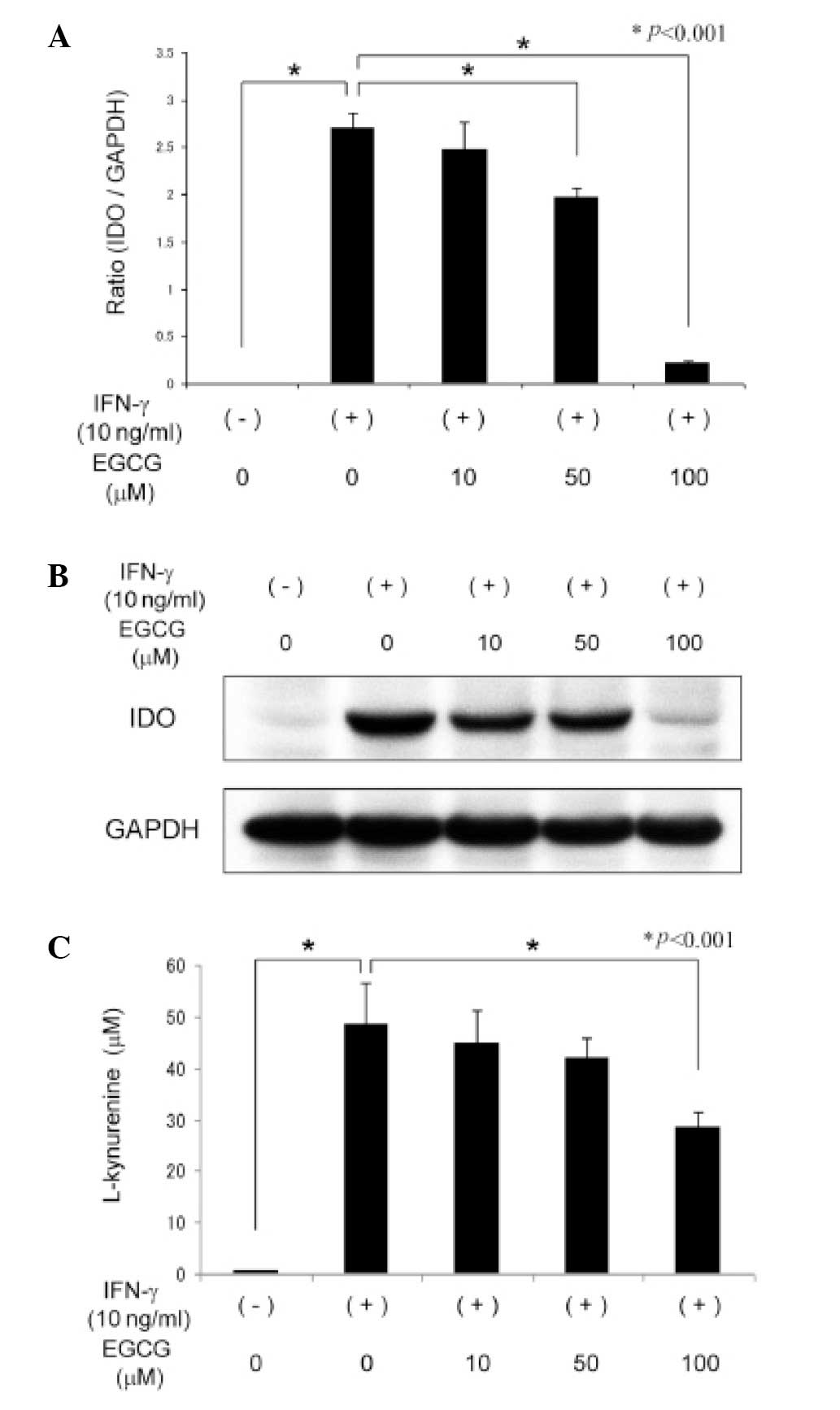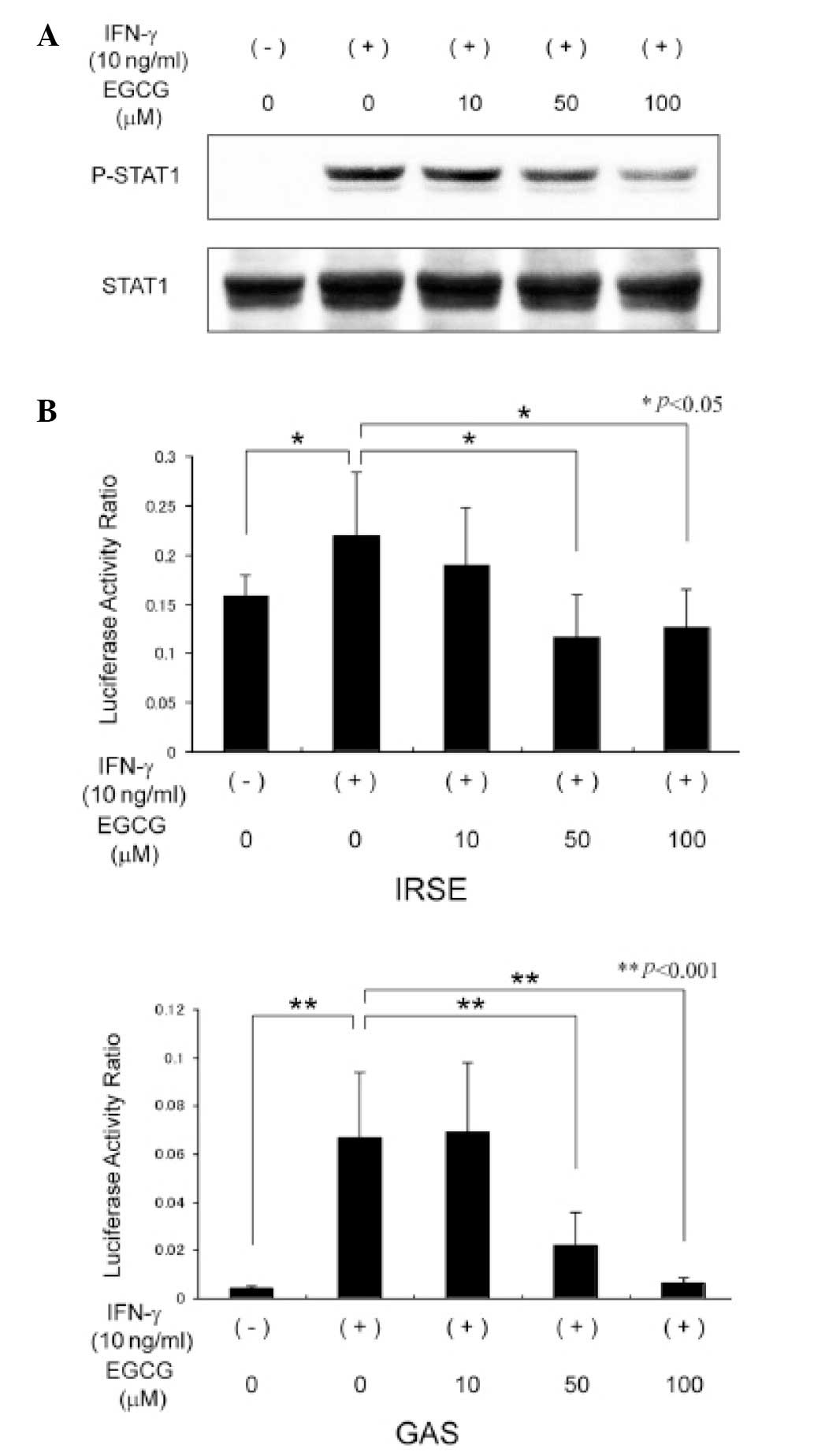|
1
|
Zitvogel L, Tesniere A and Kroemer G:
Cancer despite immunosurveillance: immunoselection and
immunosubversion. Nat Rev Immunol. 6:715–727. 2006. View Article : Google Scholar : PubMed/NCBI
|
|
2
|
Boon T and van der Bruggen P: Human tumor
antigens recognized by T lymphocytes. J Exp Med. 183:725–729. 1996.
View Article : Google Scholar : PubMed/NCBI
|
|
3
|
Mellor AL and Munn DH: IDO expression by
dendritic cells: tolerance and tryptophan catabolism. Nat Rev
Immunol. 4:762–774. 2004. View
Article : Google Scholar : PubMed/NCBI
|
|
4
|
Munn DH, Sharma MD, Lee JR, et al:
Potential regulatory function of human dendritic cells expressing
indoleamine 2,3-dioxygenase. Science. 297:1867–1870. 2002.
View Article : Google Scholar : PubMed/NCBI
|
|
5
|
Frumento G, Rotondo R, Tonetti M, Damonte
G, Benatti U and Ferrara GB: Tryptophan-derived catabolites are
responsible for inhibition of T and natural killer cell
proliferation induced by indoleamine 2,3-dioxygenase. J Exp Med.
196:459–468. 2002. View Article : Google Scholar : PubMed/NCBI
|
|
6
|
Lob S, Konigsrainer A, Rammensee HG, Opelz
G and Terness P: Inhibitors of indoleamine-2,3-dioxygenase for
cancer therapy: can we see the wood for the trees? Nat Rev Cancer.
9:445–452. 2009. View
Article : Google Scholar : PubMed/NCBI
|
|
7
|
Brandacher G, Perathoner A, Ladurner R, et
al: Prognostic value of indoleamine 2,3-dioxygenase expression in
colorectal cancer: effect on tumor-infiltrating T cells. Clin
Cancer Res. 12:1144–1151. 2006. View Article : Google Scholar : PubMed/NCBI
|
|
8
|
Ferdinande L, Decaestecker C, Verset L, et
al: Clinicopathological significance of indoleamine 2,3-dioxygenase
1 expression in colorectal cancer. Br J Cancer. 106:141–147. 2012.
View Article : Google Scholar : PubMed/NCBI
|
|
9
|
Ninomiya S, Hara T, Tsurumi H, et al:
Indoleamine 2,3-dioxygenase in tumor tissue indicates prognosis in
patients with diffuse large B-cell lymphoma treated with R-CHOP.
Ann Hematol. 90:409–416. 2010. View Article : Google Scholar : PubMed/NCBI
|
|
10
|
Yoshikawa T, Hara T, Tsurumi H, et al:
Serum concentration of L-kynurenine predicts the clinical outcome
of patients with diffuse large B-cell lymphoma treated with R-CHOP.
Eur J Haematol. 84:304–309. 2010. View Article : Google Scholar : PubMed/NCBI
|
|
11
|
Ninomiya S, Hara T, Tsurumi H, et al:
Indoleamine 2,3-dioxygenase expression and serum kynurenine
concentrations in patients with diffuse large B-cell lymphoma. Leuk
Lymphoma. 53:1143–1145. 2012. View Article : Google Scholar : PubMed/NCBI
|
|
12
|
Ogawa K, Hara T, Shimizu M, et al:
Suppression of azoxymethane-induced colonic preneoplastic lesions
in rats by 1-methyltryptophan, an inhibitor of indoleamine
2,3-dioxygenase. Cancer Sci. 103:951–958. 2012. View Article : Google Scholar : PubMed/NCBI
|
|
13
|
Ikeda H, Old LJ and Schreiber RD: The
roles of IFN gamma in protection against tumor development and
cancer immunoediting. Cytokine Growth Factor Rev. 13:95–109. 2002.
View Article : Google Scholar : PubMed/NCBI
|
|
14
|
Katz JB, Muller AJ and Prendergast GC:
Indoleamine 2,3-dioxygenase in T-cell tolerance and tumoral immune
escape. Immunol Rev. 222:206–221. 2008. View Article : Google Scholar : PubMed/NCBI
|
|
15
|
Chon SY, Hassanain HH and Gupta SL:
Cooperative role of interferon regulatory factor 1 and p91 (STAT1)
response elements in interferon-gamma-inducible expression of human
indoleamine 2,3-dioxygenase gene. J Biol Chem. 271:17247–17252.
1996. View Article : Google Scholar : PubMed/NCBI
|
|
16
|
Jiang GM, He YW, Fang R, et al: Sodium
butyrate down-regulation of indoleamine 2, 3-dioxygenase at the
transcriptional and post-transcriptional levels. Int J Biochem Cell
Biol. 42:1840–1846. 2010. View Article : Google Scholar : PubMed/NCBI
|
|
17
|
Yang CS, Maliakal P and Meng X: Inhibition
of carcinogenesis by tea. Annu Rev Pharmacol Toxicol. 42:25–54.
2002. View Article : Google Scholar : PubMed/NCBI
|
|
18
|
Yang CS, Wang X, Lu G and Picinich SC:
Cancer prevention by tea: animal studies, molecular mechanisms and
human relevance. Nat Rev Cancer. 9:429–439. 2009. View Article : Google Scholar : PubMed/NCBI
|
|
19
|
Shimizu M, Deguchi A, Lim JT, Moriwaki H,
Kopelovich L and Weinstein IB: (-)-Epigallocatechin gallate and
polyphenon E inhibit growth and activation of the epidermal growth
factor receptor and human epidermal growth factor receptor-2
signaling pathways in human colon cancer cells. Clin Cancer Res.
11:2735–2746. 2005. View Article : Google Scholar
|
|
20
|
Shimizu M, Deguchi A, Joe AK, McKoy JF,
Moriwaki H and Weinstein IB: EGCG inhibits activation of HER3 and
expression of cyclooxygenase-2 in human colon cancer cells. J Exp
Ther Oncol. 5:69–78. 2005.PubMed/NCBI
|
|
21
|
Shimizu M, Deguchi A, Hara Y, Moriwaki H
and Weinstein IB: EGCG inhibits activation of the insulin-like
growth factor-1 receptor in human colon cancer cells. Biochem
Biophys Res Commun. 334:947–953. 2005. View Article : Google Scholar : PubMed/NCBI
|
|
22
|
Shirakami Y, Shimizu M, Tsurumi H, Hara Y,
Tanaka T and Moriwaki H: EGCG and polyphenon E attenuate
inflammation-related mouse colon carcinogenesis induced by AOM and
DSS. Mol Med Report. 1:355–361. 2008.PubMed/NCBI
|
|
23
|
Shimizu M, Shirakami Y, Sakai H, et al:
(-)-Epigallocatechin gallate suppresses azoxymethane-induced
colonic premalignant lesions in male C57BL/KsJ-db/db mice. Cancer
Prev Res (Phila). 1:298–304. 2008. View Article : Google Scholar : PubMed/NCBI
|
|
24
|
Jeong YI, Jung ID, Lee JS, Lee CM, Lee JD
and Park YM: (-)-Epigallocatechin gallate suppresses indoleamine
2,3-dioxygenase expression in murine dendritic cells: evidences for
the COX-2 and STAT1 as potential targets. Biochem Biophys Res
Commun. 354:1004–1009. 2007. View Article : Google Scholar : PubMed/NCBI
|
|
25
|
Cheng CW, Shieh PC, Lin YC, et al:
Indoleamine 2,3-dioxygenase, an immunomodulatory protein, is
suppressed by (-)-epigallocatechin-3-gallate via blocking of
gamma-interferon-induced JAK-PKC-delta-STAT1 signaling in human
oral cancer cells. J Agric Food Chem. 58:887–894. 2010. View Article : Google Scholar : PubMed/NCBI
|
|
26
|
Menegazzi M, Tedeschi E, Dussin D, et al:
Anti-interferon gamma action of epigallocatechin-3-gallate mediated
by specific inhibition of STAT1 activation. FASEB J. 15:1309–1311.
2001.PubMed/NCBI
|
|
27
|
Hoshi M, Saito K, Hara A, et al: The
absence of IDO upregulates type I IFN production, resulting in
suppression of viral replication in the retrovirus-infected mouse.
J Immunol. 185:3305–3312. 2010. View Article : Google Scholar : PubMed/NCBI
|
|
28
|
Shirakami Y, Shimizu M, Adachi S, et al:
(-)-Epigallocatechin gallate suppresses the growth of human
hepatocellular carcinoma cells by inhibiting activation of the
vascular endothelial growth factor-vascular endothelial growth
factor receptor axis. Cancer Sci. 100:1957–1962. 2009. View Article : Google Scholar
|
|
29
|
Fujigaki S, Saito K, Sekikawa K, et al:
Lipopolysaccharide induction of indoleamine 2,3-dioxygenase is
mediated dominantly by an IFN-gamma-independent mechanism. Eur J
Immunol. 31:2313–2318. 2001. View Article : Google Scholar : PubMed/NCBI
|
|
30
|
Muller AJ, DuHadaway JB, Donover PS,
Sutanto-Ward E and Prendergast GC: Inhibition of indoleamine
2,3-dioxygenase, an immunoregulatory target of the cancer
suppression gene Bin1, potentiates cancer chemotherapy. Nat Med.
11:312–319. 2005. View
Article : Google Scholar : PubMed/NCBI
|
|
31
|
Hou DY, Muller AJ, Sharma MD, et al:
Inhibition of indoleamine 2,3-dioxygenase in dendritic cells by
stereoisomers of 1-methyl-tryptophan correlates with antitumor
responses. Cancer Res. 67:792–801. 2007. View Article : Google Scholar : PubMed/NCBI
|
|
32
|
Huang A, Fuchs D, Widner B, Glover C,
Henderson DC and Allen-Mersh TG: Serum tryptophan decrease
correlates with immune activation and impaired quality of life in
colorectal cancer. Br J Cancer. 86:1691–1696. 2002. View Article : Google Scholar : PubMed/NCBI
|
|
33
|
Koblish HK, Hansbury MJ, Bowman KJ, et al:
Hydroxyamidine inhibitors of indoleamine-2,3-dioxygenase potently
suppress systemic tryptophan catabolism and the growth of
IDO-expressing tumors. Mol Cancer Ther. 9:489–498. 2010. View Article : Google Scholar : PubMed/NCBI
|

















